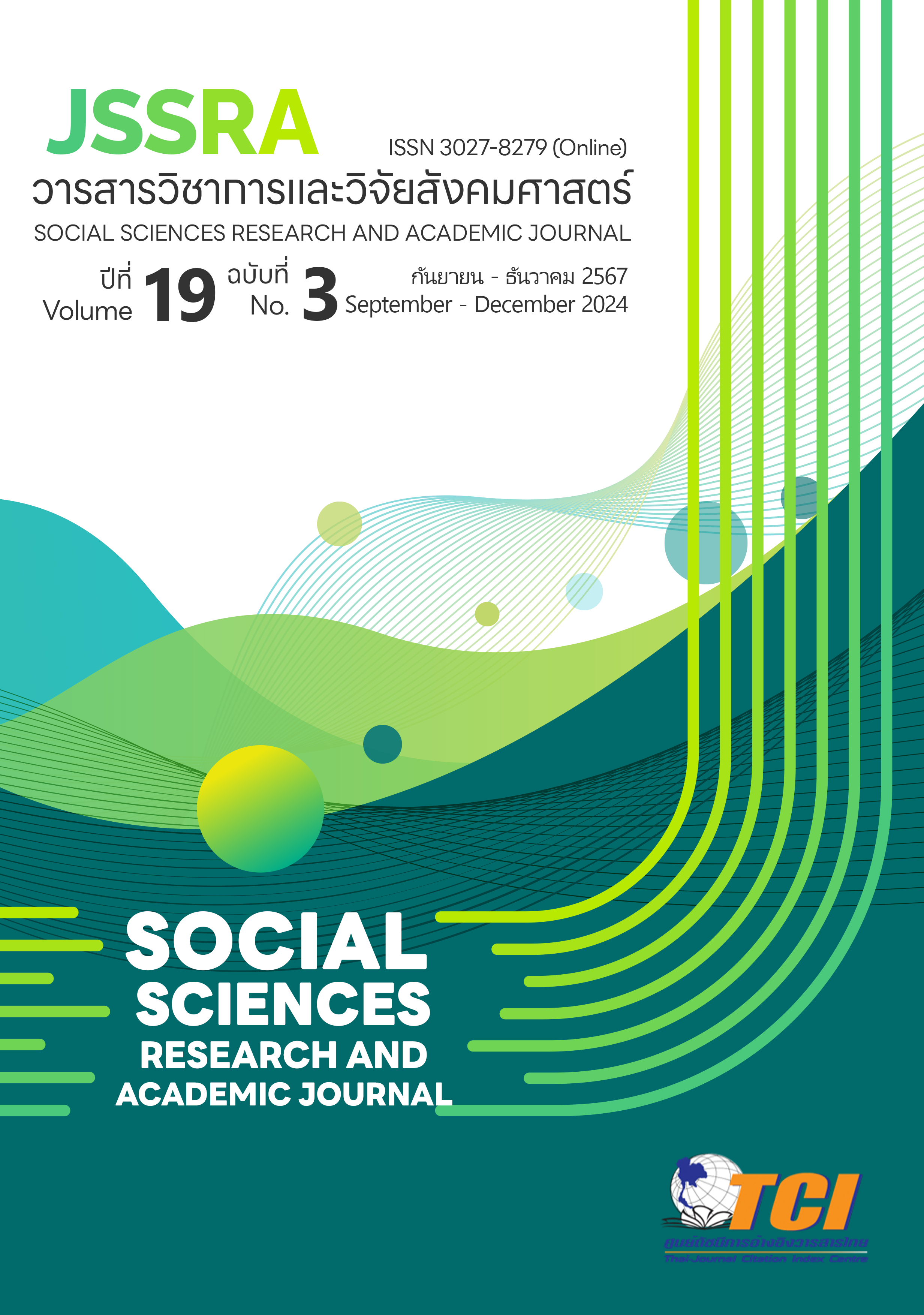Management Process of Demographic Causal Factors to Promote Life Skills and Careers under the Sufficiency Economy Philosophy for Youths in Nan Province
Main Article Content
Abstract
The objectives of this research were to: 1) study life and career skills under the philosophy of Sufficiency Economy for youth in Nan Province, 2) study demographic causal factors affecting life and career skills under the philosophy of Sufficiency Economy of youth in Nan Province, and 3) study management process of demographic causal factors to promote life and career skills under Philosophy of Sufficiency Economy among youth in Nan Province. The sample group used in the research were 527 youths from Nan Province between the ages of 15-25 years which selected by multistage random sampling, and a group of 20 experts selected by purposive sampling. The research tools used for collecting data were the questionnaire on life and career skills under the philosophy of Sufficiency Economy for youth was an estimation scale questionnaire. with a confidence coefficient equal to .78 and focus group discussion recording form. Data were analyzed by finding descriptive statistics and analysis of causal factors using LisRel program and using content analysis for focus group discussion.
The research results were found that: 1. Life and career skills under the philosophy of Sufficiency Economy for youth in Nan Province in overall was at a high level. The highest average was time management skills and the lowest average was modern occupational skill. 2. The accessibility to state welfare had the greatest direct and indirect impact on life skills and careers under the philosophy of sufficiency economy for youth in overall and the housing factor has the greatest statistically significant indirect effect at the .01 level. 3. The management process of factors to promote life skills and careers under the philosophy of sufficiency economy for youth in Nan Province consisted of Considering demographic factors, Identifying target groups and objectives, Designing activities and learning materials, Implementing targeted activities and Monitoring and evaluation.
Article Details
References
Barna, L. M. (1994). Stumbling Blocks in International Communication. In L.A.
Central database of the Department of Health. (2024). Information on the elderly. Retrieved 21 April 2024, from https://dohdatacenter.anamai.moph.go.th/ (In Thai).
Cheryan, S., Ziegler, S. A., Montoya, A. K., & Jiang, L. (2017). Why are some STEM fields more gender balanced than others?. Psychological Bulletin, 143(1), 1-35.
Hartung, P. J., Porfeli, E. J., & Vondracek, F. W. (2005). Child vocational development: A review and reconsideration. Journal of Vocational Behavior, 66(3), 385-419.
Hoffner, C. A., & Buchanan, M. (2005). Young adults' wishful identification with television characters : The role of perceived attractiveness and character traits. Media Psychology, 7(4), 325-351.
Nan Provincial Statistical Office. (2021). Nan Province Statistics Report. Nan : Nan Provincial Statistical Office. (In Thai).
Hansawasdi, P. (2024). Basic knowledge about male and female equality. Retrieved 21 April 2024, from https://nsotraining.nso.go.th/download/13-22-41_2022-08-18.pdf. (In Thai).
Bhula-Or, R. (2021). What causes Thai children to become NEETs? : Solving the problem of outsiders in the labor market and education. Retrieved 21 April 2024, from https://www.eef.or.th/ruttiya-neets-interview/. (In Thai).
Noppakit, S. (2018). Organizing activities to develop students' life skills in the 21st century. Journal of Education. Khon Kaen University, 8(1), 53-66. (In Thai).
Phongta, T. et al. (2024). Research report on Developing life and career skills of a network of youth leaders under the philosophy of Sufficiency Economy through the learning process towards
a creative economy (BCG) in Nan Province. Chiang Rai : Chiang Rai Rajabhat University.
(In Thai).
The Chaipattana Foundation. (2024). Sufficiency Economy Phylosophy. Retrieved 21 April 2024, from https://www.chaipat.or.th/publication/publish-document/sufficiency-economy.html. (In Thai).
Thai PBS Policy Watch. (2023). Equality in welfare by the state is “vague, high expectations”. Retrieved 21 April 2024, from https://policywatch.thaipbs.or.th/article/life-1. (In Thai).
The101.world. (2023). Revealing statistics for special education for Thai students: When schools cannot bring children to shore. Retrieved 21 April 2024, from https://www.the101.world/shadow-education-in-thailand/. (In Thai).
Yangklang, W. Chaijukul, Y. & Sombatwatthana, P. (2022). Consistency and differences in leisure behavior according to the perspective of various sciences. The Periodical of Behavioral Science, 26(2), 1-15. (In Thai).
Yuvabadhana Foundation. (2024). Life skills, important things for teenagers in the 21st century. Retrieved 21 April 2024, from https://www.yuvabadhanafoundation.org/th. (In Thai).


